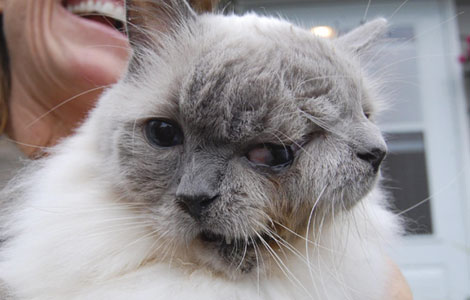95 still in hospital after subway crash
Updated: 2011-09-29 08:16
By Wang Zhenghua (China Daily)
|
|||||||||||
SHANGHAI - The majority of passengers injured in Tuesday's subway accident have been discharged from hospital, health authorities in this eastern metropolis said on Wednesday.
A total of 284 people were hurt when a metro train rear-ended another service stalled on Line 10 at about 3 pm.
Doctors said most of the injuries were bruises and bone fractures, as well as some cases of external head trauma.
As of Wednesday, 189 victims had been given the all clear, including four of the seven foreigners rescued from the scene.
Ages of the injured passengers range from 6 months old to 85. Yet, much of the public's concern has been focused on a mother-to-be who was reportedly thrown 3 meters in the air when the carriage she was seated in was hit from behind by the other train.
The Shanghai health bureau said the woman, identified only as Wang, is seven months pregnant with twins. She was transferred to a hospital specialized in maternity care and both mother and children are safe, officials said.
Another 95 people are also still receiving treatment and are in stable conditions, said Qu Jieming, deputy director of Shanghai health bureau. He added that all medical expenses will be covered by the government.
The crash happened on Line 10 in a tunnel connecting Laoxinmen and Yuyuan Garden stations. Services were halted to allow for investigation teams to check the area and restarted at 8 pm on Wednesday.
According to a notice posted on the official micro blog of Shanghai Shentong Metro Group, the subway's sole operator, the blame lies with an electrical failure that interrupted signaling and subsequent irregular operation by workers.
The signal systems were made by Casco Signal, a joint venture between China Railway Signal and Communication Corp and Alstom, a French power and transport engineering group, Xinhua News Agency reported.
Casco's systems were also used on the line where two high-speed trains crashed in Zhejiang province in July, killing 40 people, said the report.
However, Dominique Pouliquen, president of Alstom China, has denied the claim.
"Casco has never made signaling systems for high-speed trains in China," he told AFP, adding that the company was "participating in the ongoing (metro) investigation". He did not comment further.
Shanghai has 11 lines running on more than 400 kilometers of track, as well as a link to its main international airport.
To cope with the suspension of Line 10, shuttle buses were arranged between Yili Road and North Sichuan Road stations, a route that passes a number of popular tourist spots.
Many commuters complained they were still late for work.
"The journey takes about 10 minutes on the subway, but it takes 45 minutes on a shuttle bus," said a passenger surnamed Zhang traveling from Hailun Road Station to Yuyuan Garden on Wednesday.
The bus company said buses were dispatched every two to three minutes during rush hour, but roads became very congested in downtown Shanghai.
Other commuters rode the subway, although some admitted the accident had made them feel a little uneasy.
"My friend and I made sure we walked to the middle of the train this morning," said commuter Zhang Yu, as she used Line 1. "The accident shows the metro lines are not as safe as we expected."
Shanghai Shentong Metro Group said 1.54 million passengers had made journeys on the city's subway as of 9:30 am on Wednesday.
Reuters contributed to this story.
China Daily
Hot Topics
Libya conflict, Gaddafi, Oil spill, Palace Museum scandal, Inflation, Japan's new PM, Trapped miners, Mooncake tax, Weekly photos, Hurricane Irene
Editor's Picks

|

|

|

|

|

|






